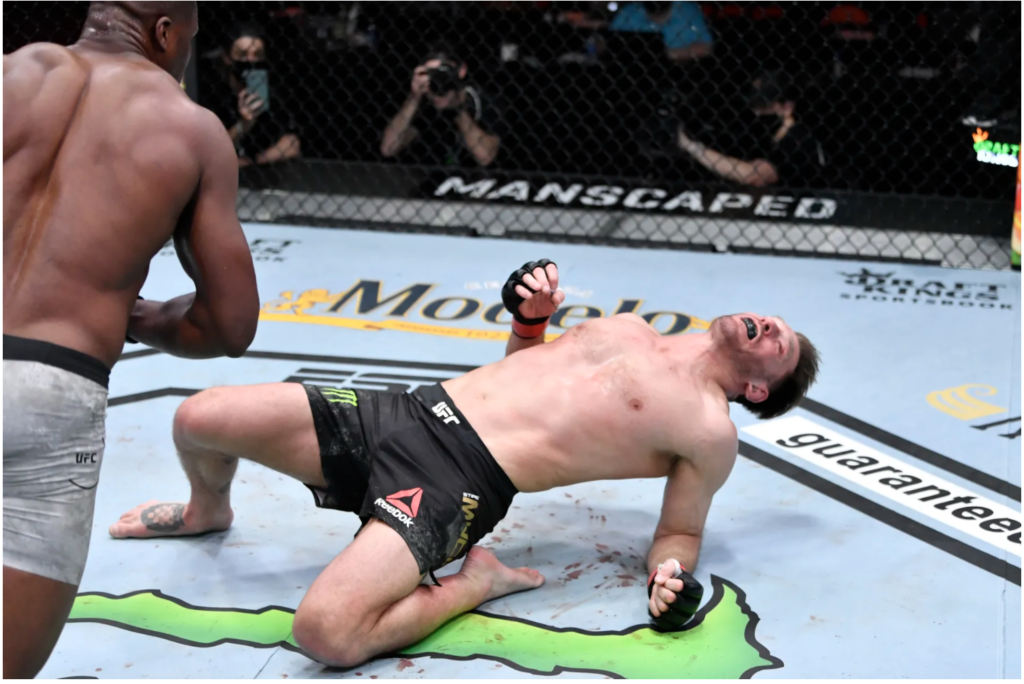
BY: JORDAN ROSAS
On Saturday night, No. 1 ranked contender Francis Ngannou defeated UFC heavyweight champion Stipe Miocic by second-round KO. Ngannou, who holds the world record for the hardest punch ever measured, hit the 38-year-old now ex-champion with a sneaky left hand in round 2. Miocic was out before he hit the ground. It wasn’t a full-force punch, but any fighter will attest that the most dangerous punch is the one you don’t see coming. Not long after, Miocic took to social media to apologize for the loss.
“…To my family friends and fans, especially Croatia and Cleveland..
I love you and I’m sorry. I hate letting you down…
…That was my error that I accept, it won’t happen again…”
Stipe Miococ
The apology doesn’t sit well with me, though. Stipe didn’t crash my car. He didn’t cheat on his wife. He didn’t use a derogatory term when referring to Ngannou. He didn’t pull out of the fight, and he certainly didn’t refuse to defend the title. All of these are egregious offenses of varying degrees, which would merit an apology.
What Miocic did instead was, at 38 years old (likely in the twilight of his athletic career, although Tom Brady and Bernard Hopkins would beg to differ), step into the octagon to defend the UFC heavyweight title against the No. 1 ranked contender. He fought, was beaten fairly, and graciously relinquished the title to the new champion, Francis Ngannou, who was equally gracious upon its reception.
This is exactly what is supposed to happen. This peaceful (after the fight) transfer of power is what made combat sports so great in the first place—the immediate post-fight hug after an intense slugfest. Almost every great champion has lost the title. Very few retire as an undefeated champion.
Muhammad Ali, boxing’s first heavyweight “champion emeritus,” so to speak, lost to Joe Frazier. We respect him because he won the title back. He lost again to Leon Spinks. We respect him because he won it back. At 38, he challenged the undefeated Larry Holmes for the championship and lost. He finished his career with a record of 56-5. Yet, he is universally respected and considered by many to be the greatest of all-time because he consistently fought the best in his era. Sugar Ray Robinson, widely regarded as boxing’s pound-for-pound GOAT, was 173-19-6, with 2 no contests.
Rocky Marciano retired as the heavyweight champion at a perfect 49-0. But many drop him in the rankings because of the lack of strong opposition in his era. More recently, Floyd “Money” Mayweather retired as the pound-for-pound king at 49-0, though he later made it 50-0 with a win over Conor McGregor. He’s often criticized for ducking Manny Pacquiao, among others.
In the much younger history of the UFC, Georges St. Pierre is often held as the general consensus GOAT. He’s 26-2. Some argue for Anderson Silva. He’s 34-11 but was 33-4 before 2013. Reigning champion Amanda Nunes is likely the greatest female in UFC history, at 21-4. Meanwhile, the status of recently retired Khabib Nurmegomedov (29-0) is still widely debated. At 20-0 (now 20-1), middleweight champion Israel Adesanya perhaps earned more respect by moving up to challenge for the light heavyweight crown than in any of his previous fights, even though he lost the challenge.
Perhaps it’s extremist capitalism, social media, or millennials, or whatever the hot new scapegoat is, but we’re getting dangerously close to losing an integral aspect of combat sports. Great fighters are defined by great fights, not great records. As the saying goes, it’s not about how many times you get knocked down, it’s about how many times you get back up. A title is only as great as the fighters the champion had to get through to win it.
We’re already seeing plenty of boxers duck the big fights. This obsession with undefeated records is sweeping across the sport like a plague. The fact that it hasn’t become a full-blown epidemic in the UFC is arguably the biggest reason that MMA and the UFC have been steadily siphoning fans from boxing over the past couple of decades. People aren’t perfect. Mistakes, shortcomings, and disappointments happen. Let’s stop pretending that they don’t. Upsets make the sport exciting. Greatness is achieved by overcoming obstacles, not avoiding them.
Ngannou is the new UFC heavyweight champion of the world. As MMA is the most inclusive combat discipline, it’s not a stretch to call him the most unbeatable human in the world at hand-to-hand combat. Nunes is great, but she’s a bit of an underdog against a 6-foot-4” 263-pound elite fighter.
Let’s GENEROUSLY say that the top 20 heavyweight contenders in the UFC, along with maybe 10 fighters in lower weight classes, could beat Ngannou. Then we’ll add in an arbitrary 30 prizefighters from different disciplines. Finally, let’s estimate that another say 20 people around the world are not professional prizefighters but could beat Ngannou tribal warriors, non-competitive martial artists, undiscovered fighters, etc. Out of nearly 8 billion people globally, maybe, 80 of them could potentially defeat Ngannou in hand-to-hand combat.
I, along with millions of other humans worldwide, could crash someone else’s car. We could cheat on our significant others, use a derogatory term, or back out of a fight for whatever reason. Almost every single one of us has a lifetime of experience NOT defending the UFC heavyweight championship. But aside from maybe 80 people, none of us could beat Francis Ngannou.
Isn’t it ridiculous for Stipe Miocic to apologize for something that 99.999999% of people in the world couldn’t do? I think so. That’s why I’m not accepting his apology. I don’t need an apology from someone who’s done nothing wrong. He beat Ngannou the first time around, went 2 for 3 against Daniel Cormier, and proved himself to be a respectable champion, in and out of the octagon. So what if he lost the title? The UFC record for consecutive heavyweight title defenses is three. And Miocic holds it. If he really feels the need to make it up to us, I’ll happily sign up for a Ngannou trilogy fight.
For live updates and breaking news, follow Trainwreck Sports, Crossing Swords or 2 Goalies 1 Mic on Twitter or subscribe to our YouTube channel
The Sports Desk can be reached at editorialtrainwrecksports@gmail.com
